Relationship between Corporate Sustainability and Technology in UAE
VerifiedAdded on 2022/11/23
|9
|2325
|380
AI Summary
This research project explores the relationship between corporate sustainability and technology in UAE. It discusses how leadership plays a crucial role in achieving sustainability goals. The literature review covers the impact of leadership on corporate sustainability, leadership theories, and the influence of technology on enhancing business sustainability. The document type is a research project, and the assignment type is not mentioned. The subject is not mentioned, and the course code, course name, and college/university are not mentioned.
Contribute Materials
Your contribution can guide someone’s learning journey. Share your
documents today.
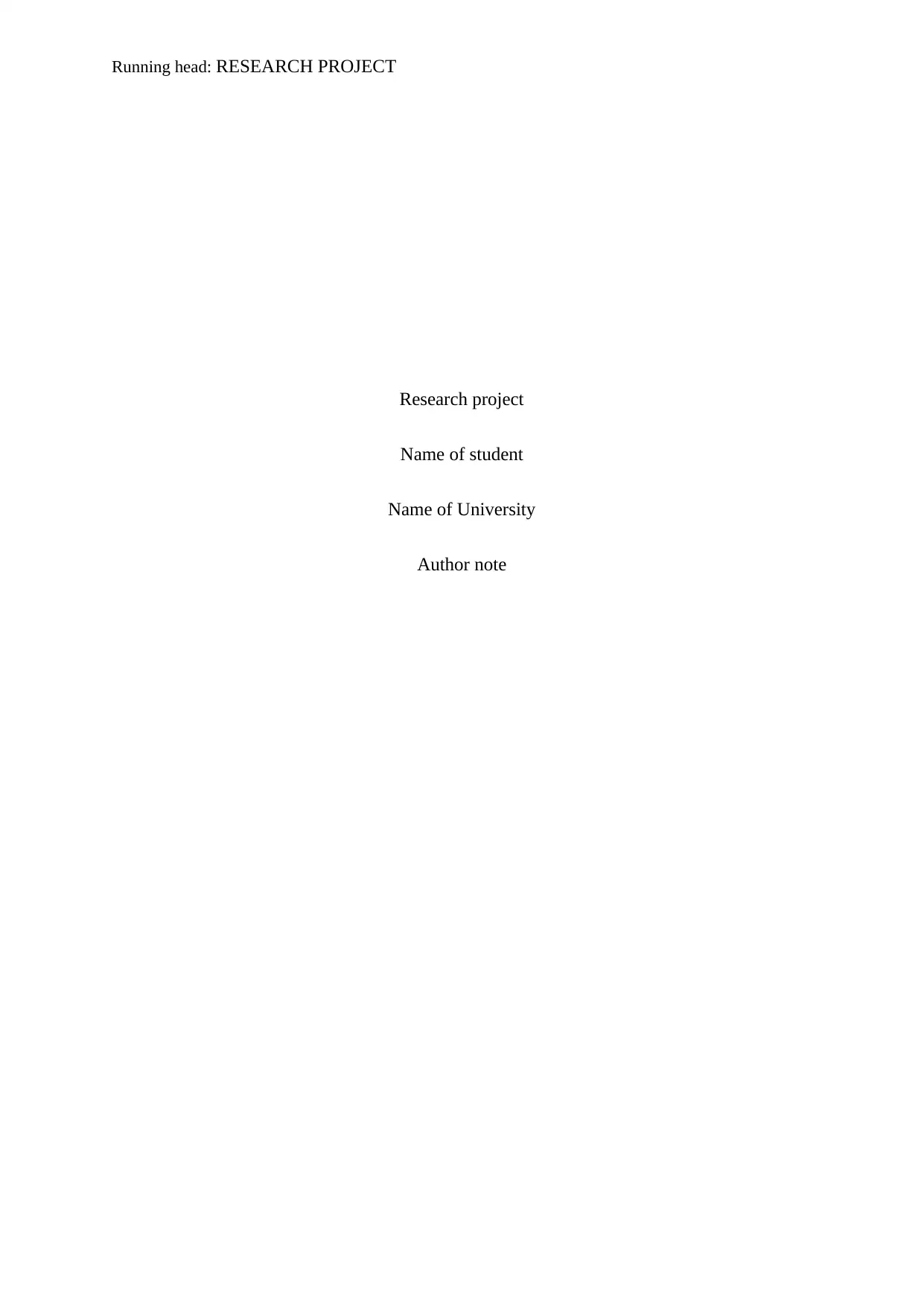
Running head: RESEARCH PROJECT
Research project
Name of student
Name of University
Author note
Research project
Name of student
Name of University
Author note
Secure Best Marks with AI Grader
Need help grading? Try our AI Grader for instant feedback on your assignments.
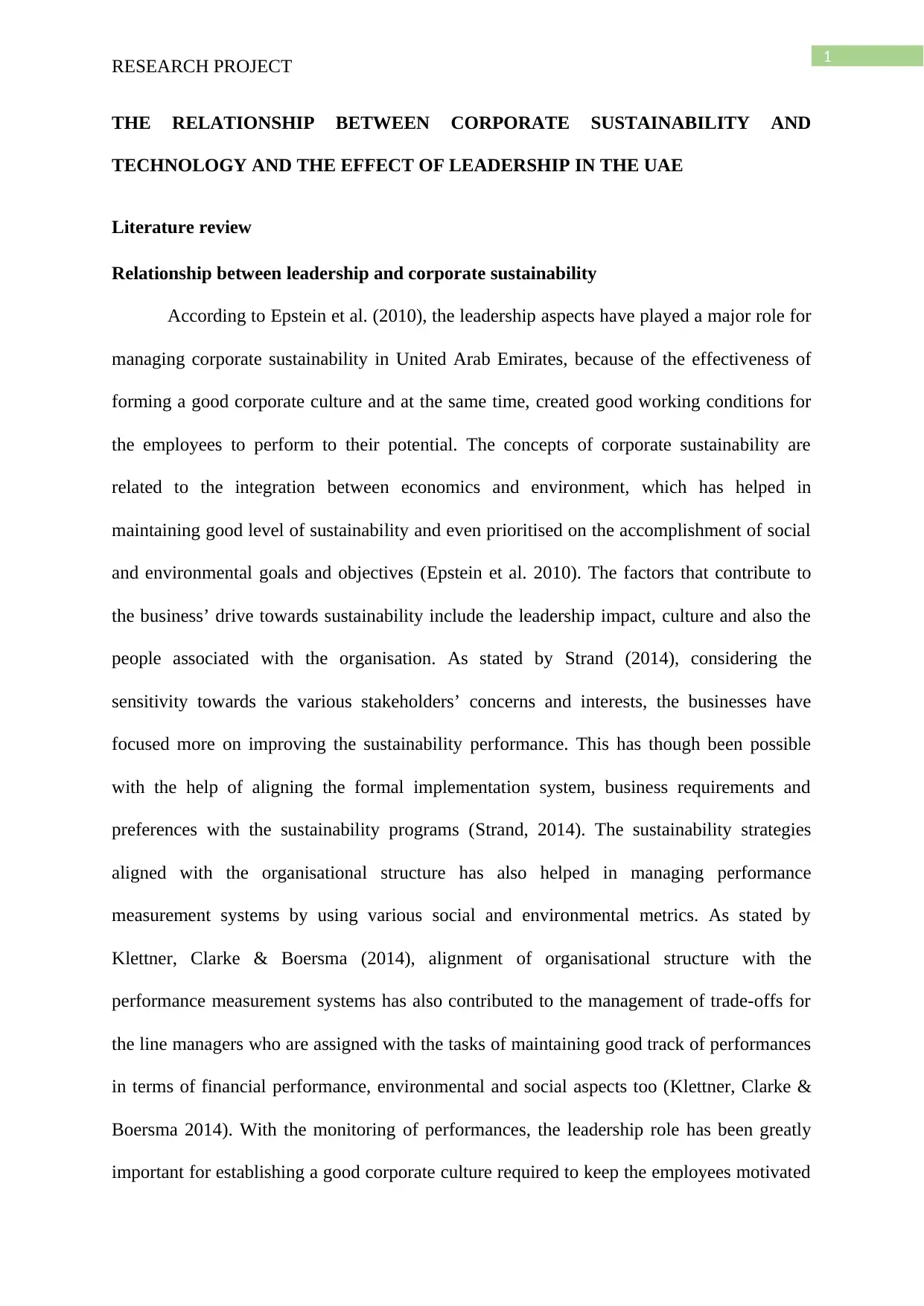
1
RESEARCH PROJECT
THE RELATIONSHIP BETWEEN CORPORATE SUSTAINABILITY AND
TECHNOLOGY AND THE EFFECT OF LEADERSHIP IN THE UAE
Literature review
Relationship between leadership and corporate sustainability
According to Epstein et al. (2010), the leadership aspects have played a major role for
managing corporate sustainability in United Arab Emirates, because of the effectiveness of
forming a good corporate culture and at the same time, created good working conditions for
the employees to perform to their potential. The concepts of corporate sustainability are
related to the integration between economics and environment, which has helped in
maintaining good level of sustainability and even prioritised on the accomplishment of social
and environmental goals and objectives (Epstein et al. 2010). The factors that contribute to
the business’ drive towards sustainability include the leadership impact, culture and also the
people associated with the organisation. As stated by Strand (2014), considering the
sensitivity towards the various stakeholders’ concerns and interests, the businesses have
focused more on improving the sustainability performance. This has though been possible
with the help of aligning the formal implementation system, business requirements and
preferences with the sustainability programs (Strand, 2014). The sustainability strategies
aligned with the organisational structure has also helped in managing performance
measurement systems by using various social and environmental metrics. As stated by
Klettner, Clarke & Boersma (2014), alignment of organisational structure with the
performance measurement systems has also contributed to the management of trade-offs for
the line managers who are assigned with the tasks of maintaining good track of performances
in terms of financial performance, environmental and social aspects too (Klettner, Clarke &
Boersma 2014). With the monitoring of performances, the leadership role has been greatly
important for establishing a good corporate culture required to keep the employees motivated
RESEARCH PROJECT
THE RELATIONSHIP BETWEEN CORPORATE SUSTAINABILITY AND
TECHNOLOGY AND THE EFFECT OF LEADERSHIP IN THE UAE
Literature review
Relationship between leadership and corporate sustainability
According to Epstein et al. (2010), the leadership aspects have played a major role for
managing corporate sustainability in United Arab Emirates, because of the effectiveness of
forming a good corporate culture and at the same time, created good working conditions for
the employees to perform to their potential. The concepts of corporate sustainability are
related to the integration between economics and environment, which has helped in
maintaining good level of sustainability and even prioritised on the accomplishment of social
and environmental goals and objectives (Epstein et al. 2010). The factors that contribute to
the business’ drive towards sustainability include the leadership impact, culture and also the
people associated with the organisation. As stated by Strand (2014), considering the
sensitivity towards the various stakeholders’ concerns and interests, the businesses have
focused more on improving the sustainability performance. This has though been possible
with the help of aligning the formal implementation system, business requirements and
preferences with the sustainability programs (Strand, 2014). The sustainability strategies
aligned with the organisational structure has also helped in managing performance
measurement systems by using various social and environmental metrics. As stated by
Klettner, Clarke & Boersma (2014), alignment of organisational structure with the
performance measurement systems has also contributed to the management of trade-offs for
the line managers who are assigned with the tasks of maintaining good track of performances
in terms of financial performance, environmental and social aspects too (Klettner, Clarke &
Boersma 2014). With the monitoring of performances, the leadership role has been greatly
important for establishing a good corporate culture required to keep the employees motivated
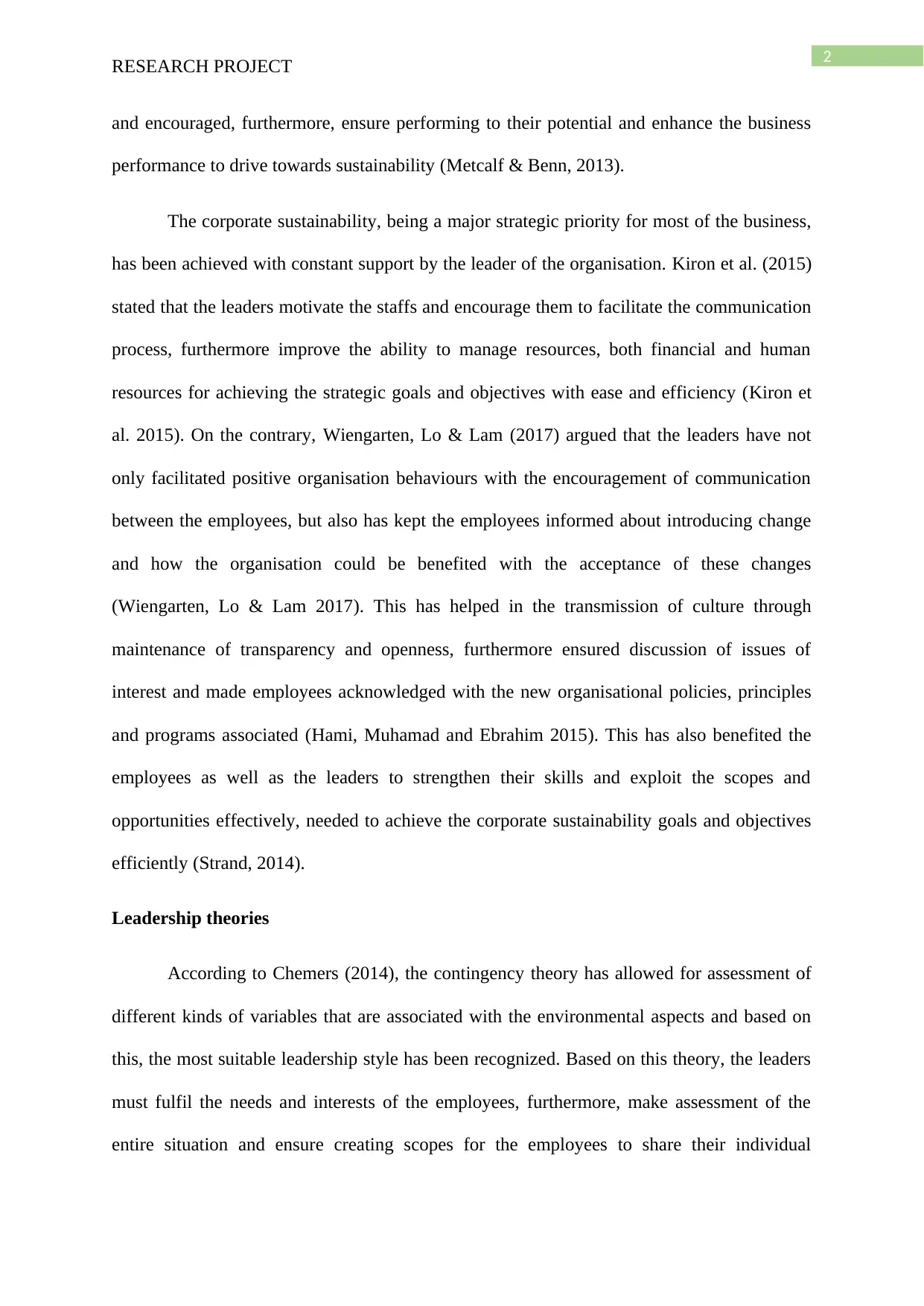
2
RESEARCH PROJECT
and encouraged, furthermore, ensure performing to their potential and enhance the business
performance to drive towards sustainability (Metcalf & Benn, 2013).
The corporate sustainability, being a major strategic priority for most of the business,
has been achieved with constant support by the leader of the organisation. Kiron et al. (2015)
stated that the leaders motivate the staffs and encourage them to facilitate the communication
process, furthermore improve the ability to manage resources, both financial and human
resources for achieving the strategic goals and objectives with ease and efficiency (Kiron et
al. 2015). On the contrary, Wiengarten, Lo & Lam (2017) argued that the leaders have not
only facilitated positive organisation behaviours with the encouragement of communication
between the employees, but also has kept the employees informed about introducing change
and how the organisation could be benefited with the acceptance of these changes
(Wiengarten, Lo & Lam 2017). This has helped in the transmission of culture through
maintenance of transparency and openness, furthermore ensured discussion of issues of
interest and made employees acknowledged with the new organisational policies, principles
and programs associated (Hami, Muhamad and Ebrahim 2015). This has also benefited the
employees as well as the leaders to strengthen their skills and exploit the scopes and
opportunities effectively, needed to achieve the corporate sustainability goals and objectives
efficiently (Strand, 2014).
Leadership theories
According to Chemers (2014), the contingency theory has allowed for assessment of
different kinds of variables that are associated with the environmental aspects and based on
this, the most suitable leadership style has been recognized. Based on this theory, the leaders
must fulfil the needs and interests of the employees, furthermore, make assessment of the
entire situation and ensure creating scopes for the employees to share their individual
RESEARCH PROJECT
and encouraged, furthermore, ensure performing to their potential and enhance the business
performance to drive towards sustainability (Metcalf & Benn, 2013).
The corporate sustainability, being a major strategic priority for most of the business,
has been achieved with constant support by the leader of the organisation. Kiron et al. (2015)
stated that the leaders motivate the staffs and encourage them to facilitate the communication
process, furthermore improve the ability to manage resources, both financial and human
resources for achieving the strategic goals and objectives with ease and efficiency (Kiron et
al. 2015). On the contrary, Wiengarten, Lo & Lam (2017) argued that the leaders have not
only facilitated positive organisation behaviours with the encouragement of communication
between the employees, but also has kept the employees informed about introducing change
and how the organisation could be benefited with the acceptance of these changes
(Wiengarten, Lo & Lam 2017). This has helped in the transmission of culture through
maintenance of transparency and openness, furthermore ensured discussion of issues of
interest and made employees acknowledged with the new organisational policies, principles
and programs associated (Hami, Muhamad and Ebrahim 2015). This has also benefited the
employees as well as the leaders to strengthen their skills and exploit the scopes and
opportunities effectively, needed to achieve the corporate sustainability goals and objectives
efficiently (Strand, 2014).
Leadership theories
According to Chemers (2014), the contingency theory has allowed for assessment of
different kinds of variables that are associated with the environmental aspects and based on
this, the most suitable leadership style has been recognized. Based on this theory, the leaders
must fulfil the needs and interests of the employees, furthermore, make assessment of the
entire situation and ensure creating scopes for the employees to share their individual
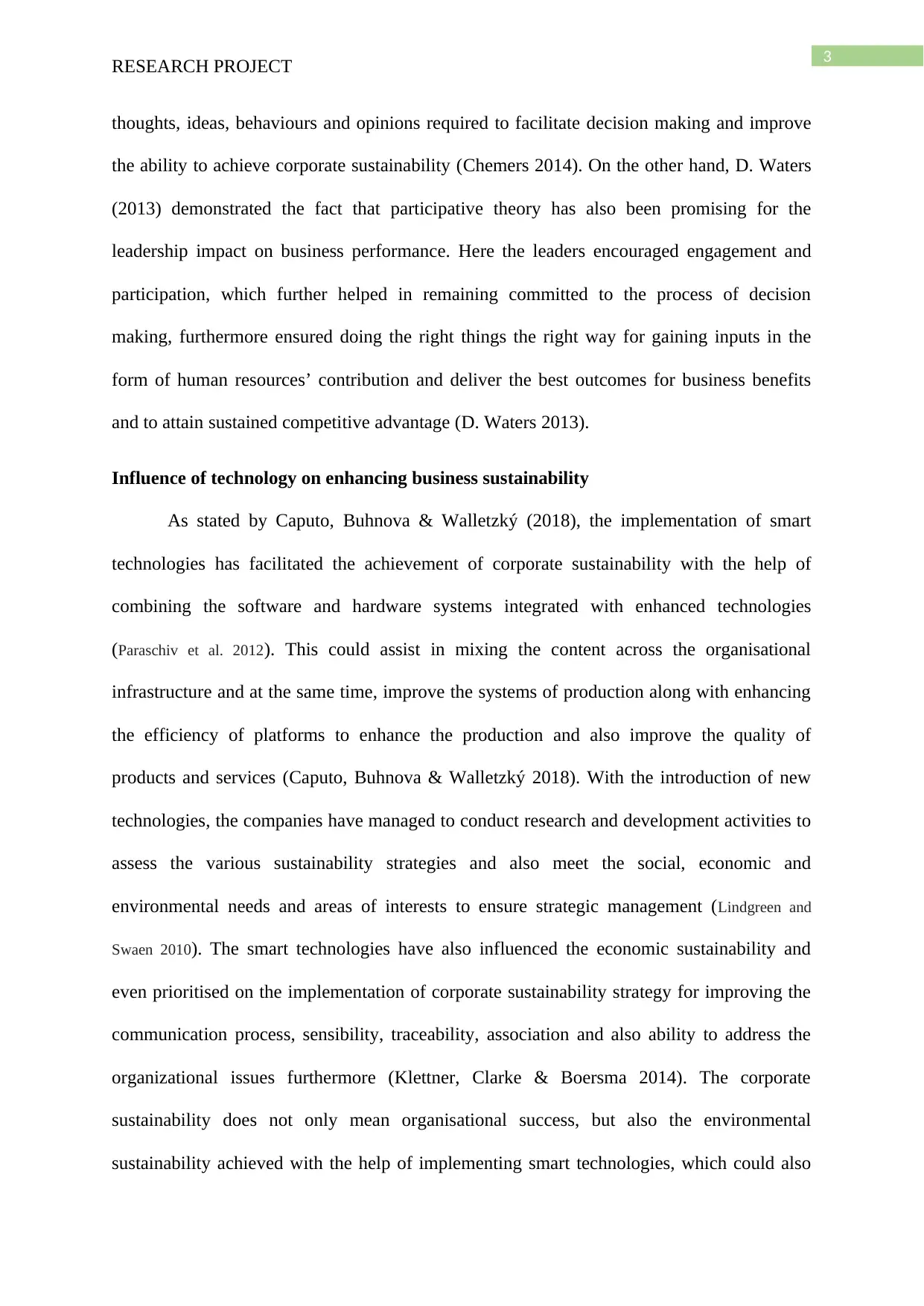
3
RESEARCH PROJECT
thoughts, ideas, behaviours and opinions required to facilitate decision making and improve
the ability to achieve corporate sustainability (Chemers 2014). On the other hand, D. Waters
(2013) demonstrated the fact that participative theory has also been promising for the
leadership impact on business performance. Here the leaders encouraged engagement and
participation, which further helped in remaining committed to the process of decision
making, furthermore ensured doing the right things the right way for gaining inputs in the
form of human resources’ contribution and deliver the best outcomes for business benefits
and to attain sustained competitive advantage (D. Waters 2013).
Influence of technology on enhancing business sustainability
As stated by Caputo, Buhnova & Walletzký (2018), the implementation of smart
technologies has facilitated the achievement of corporate sustainability with the help of
combining the software and hardware systems integrated with enhanced technologies
(Paraschiv et al. 2012). This could assist in mixing the content across the organisational
infrastructure and at the same time, improve the systems of production along with enhancing
the efficiency of platforms to enhance the production and also improve the quality of
products and services (Caputo, Buhnova & Walletzký 2018). With the introduction of new
technologies, the companies have managed to conduct research and development activities to
assess the various sustainability strategies and also meet the social, economic and
environmental needs and areas of interests to ensure strategic management (Lindgreen and
Swaen 2010). The smart technologies have also influenced the economic sustainability and
even prioritised on the implementation of corporate sustainability strategy for improving the
communication process, sensibility, traceability, association and also ability to address the
organizational issues furthermore (Klettner, Clarke & Boersma 2014). The corporate
sustainability does not only mean organisational success, but also the environmental
sustainability achieved with the help of implementing smart technologies, which could also
RESEARCH PROJECT
thoughts, ideas, behaviours and opinions required to facilitate decision making and improve
the ability to achieve corporate sustainability (Chemers 2014). On the other hand, D. Waters
(2013) demonstrated the fact that participative theory has also been promising for the
leadership impact on business performance. Here the leaders encouraged engagement and
participation, which further helped in remaining committed to the process of decision
making, furthermore ensured doing the right things the right way for gaining inputs in the
form of human resources’ contribution and deliver the best outcomes for business benefits
and to attain sustained competitive advantage (D. Waters 2013).
Influence of technology on enhancing business sustainability
As stated by Caputo, Buhnova & Walletzký (2018), the implementation of smart
technologies has facilitated the achievement of corporate sustainability with the help of
combining the software and hardware systems integrated with enhanced technologies
(Paraschiv et al. 2012). This could assist in mixing the content across the organisational
infrastructure and at the same time, improve the systems of production along with enhancing
the efficiency of platforms to enhance the production and also improve the quality of
products and services (Caputo, Buhnova & Walletzký 2018). With the introduction of new
technologies, the companies have managed to conduct research and development activities to
assess the various sustainability strategies and also meet the social, economic and
environmental needs and areas of interests to ensure strategic management (Lindgreen and
Swaen 2010). The smart technologies have also influenced the economic sustainability and
even prioritised on the implementation of corporate sustainability strategy for improving the
communication process, sensibility, traceability, association and also ability to address the
organizational issues furthermore (Klettner, Clarke & Boersma 2014). The corporate
sustainability does not only mean organisational success, but also the environmental
sustainability achieved with the help of implementing smart technologies, which could also
Secure Best Marks with AI Grader
Need help grading? Try our AI Grader for instant feedback on your assignments.
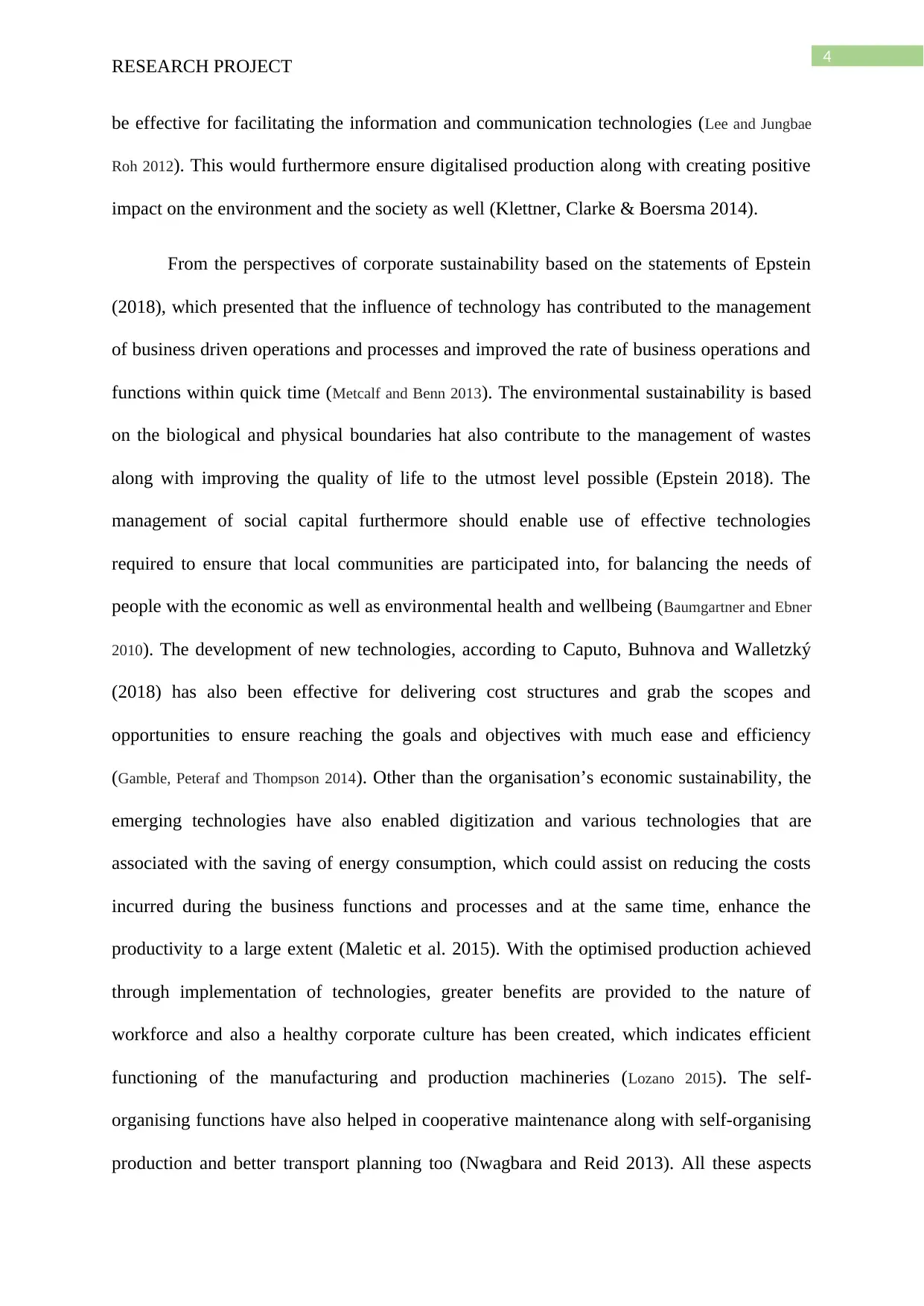
4
RESEARCH PROJECT
be effective for facilitating the information and communication technologies (Lee and Jungbae
Roh 2012). This would furthermore ensure digitalised production along with creating positive
impact on the environment and the society as well (Klettner, Clarke & Boersma 2014).
From the perspectives of corporate sustainability based on the statements of Epstein
(2018), which presented that the influence of technology has contributed to the management
of business driven operations and processes and improved the rate of business operations and
functions within quick time (Metcalf and Benn 2013). The environmental sustainability is based
on the biological and physical boundaries hat also contribute to the management of wastes
along with improving the quality of life to the utmost level possible (Epstein 2018). The
management of social capital furthermore should enable use of effective technologies
required to ensure that local communities are participated into, for balancing the needs of
people with the economic as well as environmental health and wellbeing (Baumgartner and Ebner
2010). The development of new technologies, according to Caputo, Buhnova and Walletzký
(2018) has also been effective for delivering cost structures and grab the scopes and
opportunities to ensure reaching the goals and objectives with much ease and efficiency
(Gamble, Peteraf and Thompson 2014). Other than the organisation’s economic sustainability, the
emerging technologies have also enabled digitization and various technologies that are
associated with the saving of energy consumption, which could assist on reducing the costs
incurred during the business functions and processes and at the same time, enhance the
productivity to a large extent (Maletic et al. 2015). With the optimised production achieved
through implementation of technologies, greater benefits are provided to the nature of
workforce and also a healthy corporate culture has been created, which indicates efficient
functioning of the manufacturing and production machineries (Lozano 2015). The self-
organising functions have also helped in cooperative maintenance along with self-organising
production and better transport planning too (Nwagbara and Reid 2013). All these aspects
RESEARCH PROJECT
be effective for facilitating the information and communication technologies (Lee and Jungbae
Roh 2012). This would furthermore ensure digitalised production along with creating positive
impact on the environment and the society as well (Klettner, Clarke & Boersma 2014).
From the perspectives of corporate sustainability based on the statements of Epstein
(2018), which presented that the influence of technology has contributed to the management
of business driven operations and processes and improved the rate of business operations and
functions within quick time (Metcalf and Benn 2013). The environmental sustainability is based
on the biological and physical boundaries hat also contribute to the management of wastes
along with improving the quality of life to the utmost level possible (Epstein 2018). The
management of social capital furthermore should enable use of effective technologies
required to ensure that local communities are participated into, for balancing the needs of
people with the economic as well as environmental health and wellbeing (Baumgartner and Ebner
2010). The development of new technologies, according to Caputo, Buhnova and Walletzký
(2018) has also been effective for delivering cost structures and grab the scopes and
opportunities to ensure reaching the goals and objectives with much ease and efficiency
(Gamble, Peteraf and Thompson 2014). Other than the organisation’s economic sustainability, the
emerging technologies have also enabled digitization and various technologies that are
associated with the saving of energy consumption, which could assist on reducing the costs
incurred during the business functions and processes and at the same time, enhance the
productivity to a large extent (Maletic et al. 2015). With the optimised production achieved
through implementation of technologies, greater benefits are provided to the nature of
workforce and also a healthy corporate culture has been created, which indicates efficient
functioning of the manufacturing and production machineries (Lozano 2015). The self-
organising functions have also helped in cooperative maintenance along with self-organising
production and better transport planning too (Nwagbara and Reid 2013). All these aspects
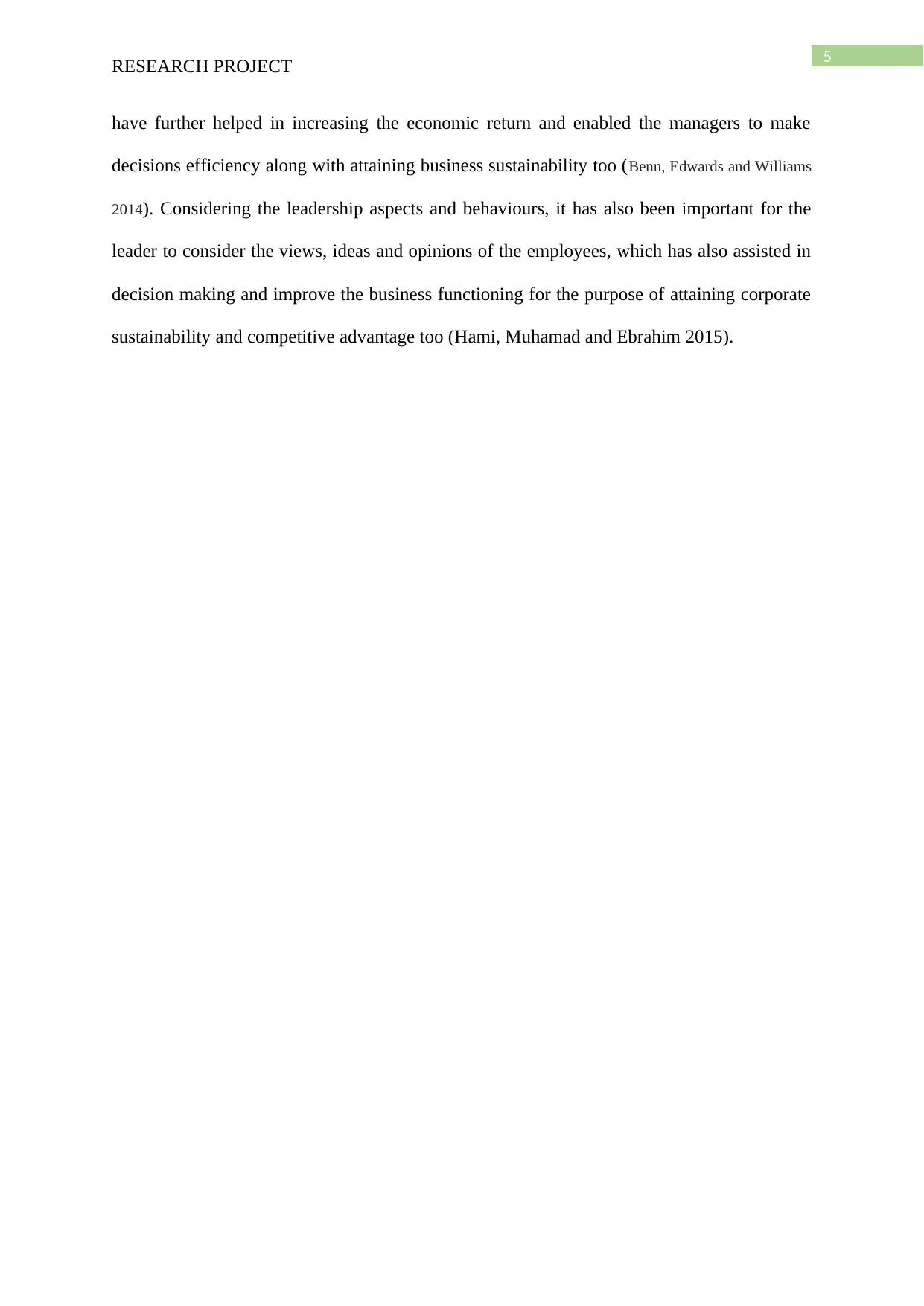
5
RESEARCH PROJECT
have further helped in increasing the economic return and enabled the managers to make
decisions efficiency along with attaining business sustainability too (Benn, Edwards and Williams
2014). Considering the leadership aspects and behaviours, it has also been important for the
leader to consider the views, ideas and opinions of the employees, which has also assisted in
decision making and improve the business functioning for the purpose of attaining corporate
sustainability and competitive advantage too (Hami, Muhamad and Ebrahim 2015).
RESEARCH PROJECT
have further helped in increasing the economic return and enabled the managers to make
decisions efficiency along with attaining business sustainability too (Benn, Edwards and Williams
2014). Considering the leadership aspects and behaviours, it has also been important for the
leader to consider the views, ideas and opinions of the employees, which has also assisted in
decision making and improve the business functioning for the purpose of attaining corporate
sustainability and competitive advantage too (Hami, Muhamad and Ebrahim 2015).
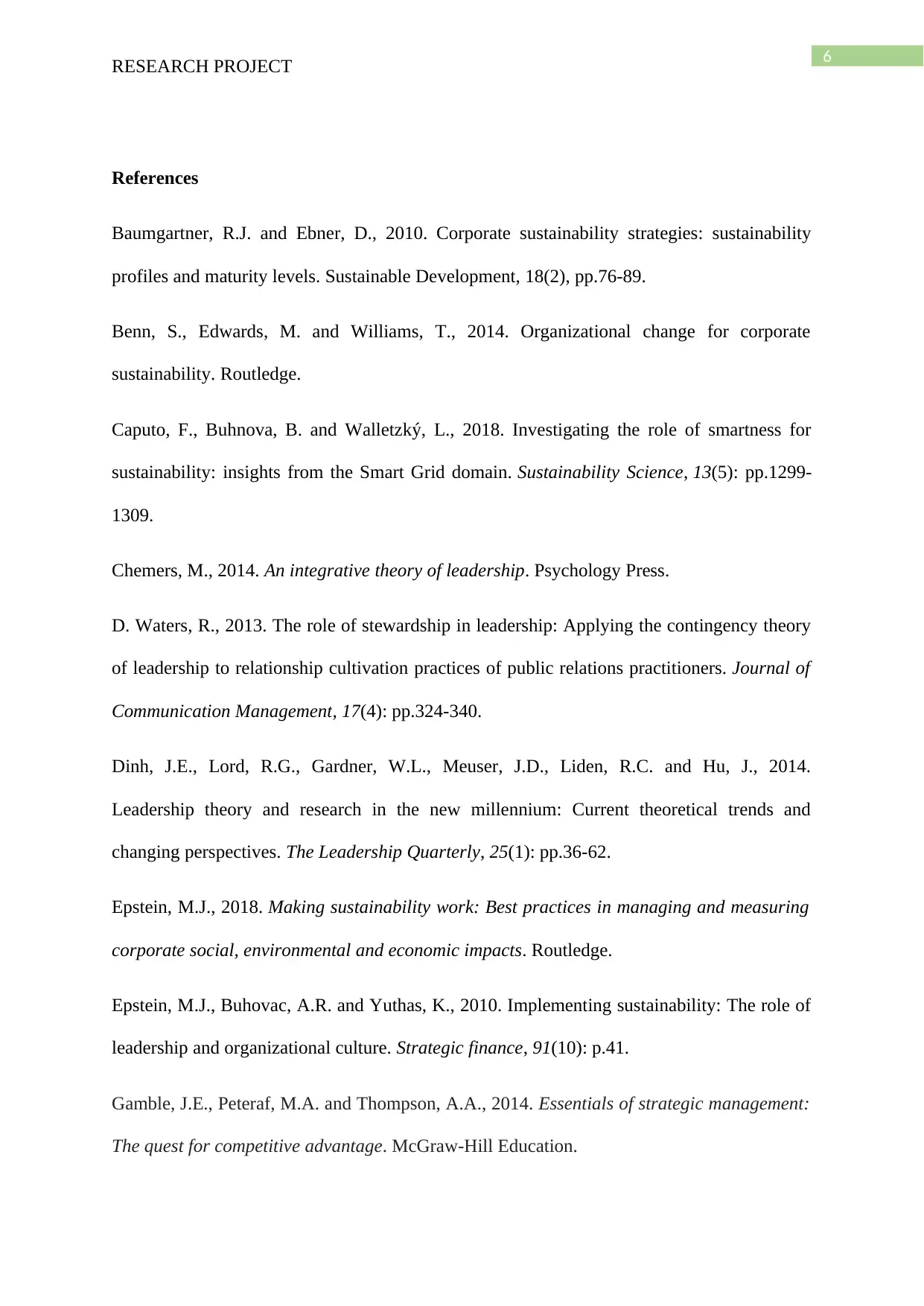
6
RESEARCH PROJECT
References
Baumgartner, R.J. and Ebner, D., 2010. Corporate sustainability strategies: sustainability
profiles and maturity levels. Sustainable Development, 18(2), pp.76-89.
Benn, S., Edwards, M. and Williams, T., 2014. Organizational change for corporate
sustainability. Routledge.
Caputo, F., Buhnova, B. and Walletzký, L., 2018. Investigating the role of smartness for
sustainability: insights from the Smart Grid domain. Sustainability Science, 13(5): pp.1299-
1309.
Chemers, M., 2014. An integrative theory of leadership. Psychology Press.
D. Waters, R., 2013. The role of stewardship in leadership: Applying the contingency theory
of leadership to relationship cultivation practices of public relations practitioners. Journal of
Communication Management, 17(4): pp.324-340.
Dinh, J.E., Lord, R.G., Gardner, W.L., Meuser, J.D., Liden, R.C. and Hu, J., 2014.
Leadership theory and research in the new millennium: Current theoretical trends and
changing perspectives. The Leadership Quarterly, 25(1): pp.36-62.
Epstein, M.J., 2018. Making sustainability work: Best practices in managing and measuring
corporate social, environmental and economic impacts. Routledge.
Epstein, M.J., Buhovac, A.R. and Yuthas, K., 2010. Implementing sustainability: The role of
leadership and organizational culture. Strategic finance, 91(10): p.41.
Gamble, J.E., Peteraf, M.A. and Thompson, A.A., 2014. Essentials of strategic management:
The quest for competitive advantage. McGraw-Hill Education.
RESEARCH PROJECT
References
Baumgartner, R.J. and Ebner, D., 2010. Corporate sustainability strategies: sustainability
profiles and maturity levels. Sustainable Development, 18(2), pp.76-89.
Benn, S., Edwards, M. and Williams, T., 2014. Organizational change for corporate
sustainability. Routledge.
Caputo, F., Buhnova, B. and Walletzký, L., 2018. Investigating the role of smartness for
sustainability: insights from the Smart Grid domain. Sustainability Science, 13(5): pp.1299-
1309.
Chemers, M., 2014. An integrative theory of leadership. Psychology Press.
D. Waters, R., 2013. The role of stewardship in leadership: Applying the contingency theory
of leadership to relationship cultivation practices of public relations practitioners. Journal of
Communication Management, 17(4): pp.324-340.
Dinh, J.E., Lord, R.G., Gardner, W.L., Meuser, J.D., Liden, R.C. and Hu, J., 2014.
Leadership theory and research in the new millennium: Current theoretical trends and
changing perspectives. The Leadership Quarterly, 25(1): pp.36-62.
Epstein, M.J., 2018. Making sustainability work: Best practices in managing and measuring
corporate social, environmental and economic impacts. Routledge.
Epstein, M.J., Buhovac, A.R. and Yuthas, K., 2010. Implementing sustainability: The role of
leadership and organizational culture. Strategic finance, 91(10): p.41.
Gamble, J.E., Peteraf, M.A. and Thompson, A.A., 2014. Essentials of strategic management:
The quest for competitive advantage. McGraw-Hill Education.
Paraphrase This Document
Need a fresh take? Get an instant paraphrase of this document with our AI Paraphraser
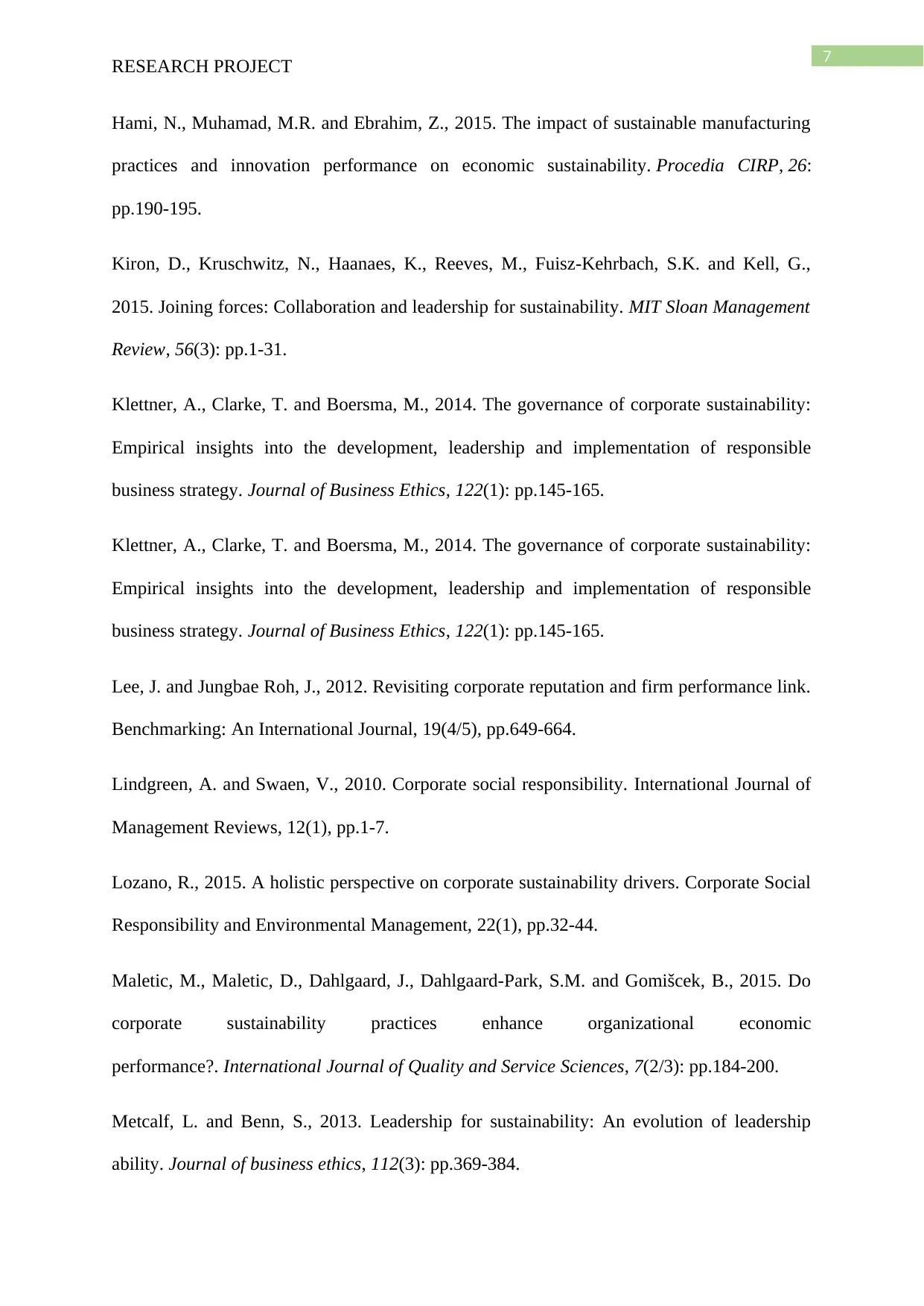
7
RESEARCH PROJECT
Hami, N., Muhamad, M.R. and Ebrahim, Z., 2015. The impact of sustainable manufacturing
practices and innovation performance on economic sustainability. Procedia CIRP, 26:
pp.190-195.
Kiron, D., Kruschwitz, N., Haanaes, K., Reeves, M., Fuisz-Kehrbach, S.K. and Kell, G.,
2015. Joining forces: Collaboration and leadership for sustainability. MIT Sloan Management
Review, 56(3): pp.1-31.
Klettner, A., Clarke, T. and Boersma, M., 2014. The governance of corporate sustainability:
Empirical insights into the development, leadership and implementation of responsible
business strategy. Journal of Business Ethics, 122(1): pp.145-165.
Klettner, A., Clarke, T. and Boersma, M., 2014. The governance of corporate sustainability:
Empirical insights into the development, leadership and implementation of responsible
business strategy. Journal of Business Ethics, 122(1): pp.145-165.
Lee, J. and Jungbae Roh, J., 2012. Revisiting corporate reputation and firm performance link.
Benchmarking: An International Journal, 19(4/5), pp.649-664.
Lindgreen, A. and Swaen, V., 2010. Corporate social responsibility. International Journal of
Management Reviews, 12(1), pp.1-7.
Lozano, R., 2015. A holistic perspective on corporate sustainability drivers. Corporate Social
Responsibility and Environmental Management, 22(1), pp.32-44.
Maletic, M., Maletic, D., Dahlgaard, J., Dahlgaard-Park, S.M. and Gomišcek, B., 2015. Do
corporate sustainability practices enhance organizational economic
performance?. International Journal of Quality and Service Sciences, 7(2/3): pp.184-200.
Metcalf, L. and Benn, S., 2013. Leadership for sustainability: An evolution of leadership
ability. Journal of business ethics, 112(3): pp.369-384.
RESEARCH PROJECT
Hami, N., Muhamad, M.R. and Ebrahim, Z., 2015. The impact of sustainable manufacturing
practices and innovation performance on economic sustainability. Procedia CIRP, 26:
pp.190-195.
Kiron, D., Kruschwitz, N., Haanaes, K., Reeves, M., Fuisz-Kehrbach, S.K. and Kell, G.,
2015. Joining forces: Collaboration and leadership for sustainability. MIT Sloan Management
Review, 56(3): pp.1-31.
Klettner, A., Clarke, T. and Boersma, M., 2014. The governance of corporate sustainability:
Empirical insights into the development, leadership and implementation of responsible
business strategy. Journal of Business Ethics, 122(1): pp.145-165.
Klettner, A., Clarke, T. and Boersma, M., 2014. The governance of corporate sustainability:
Empirical insights into the development, leadership and implementation of responsible
business strategy. Journal of Business Ethics, 122(1): pp.145-165.
Lee, J. and Jungbae Roh, J., 2012. Revisiting corporate reputation and firm performance link.
Benchmarking: An International Journal, 19(4/5), pp.649-664.
Lindgreen, A. and Swaen, V., 2010. Corporate social responsibility. International Journal of
Management Reviews, 12(1), pp.1-7.
Lozano, R., 2015. A holistic perspective on corporate sustainability drivers. Corporate Social
Responsibility and Environmental Management, 22(1), pp.32-44.
Maletic, M., Maletic, D., Dahlgaard, J., Dahlgaard-Park, S.M. and Gomišcek, B., 2015. Do
corporate sustainability practices enhance organizational economic
performance?. International Journal of Quality and Service Sciences, 7(2/3): pp.184-200.
Metcalf, L. and Benn, S., 2013. Leadership for sustainability: An evolution of leadership
ability. Journal of business ethics, 112(3): pp.369-384.
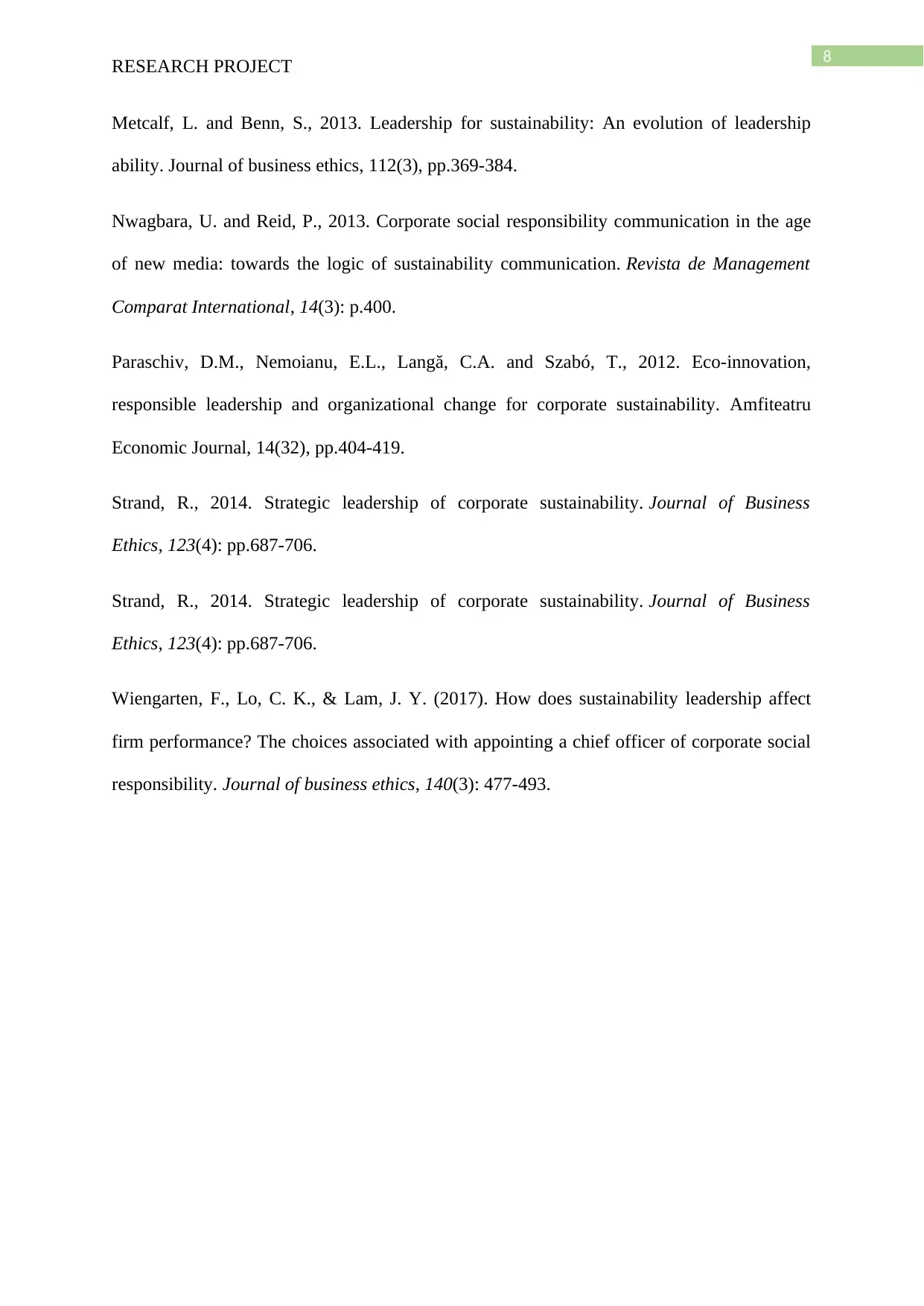
8
RESEARCH PROJECT
Metcalf, L. and Benn, S., 2013. Leadership for sustainability: An evolution of leadership
ability. Journal of business ethics, 112(3), pp.369-384.
Nwagbara, U. and Reid, P., 2013. Corporate social responsibility communication in the age
of new media: towards the logic of sustainability communication. Revista de Management
Comparat International, 14(3): p.400.
Paraschiv, D.M., Nemoianu, E.L., Langă, C.A. and Szabó, T., 2012. Eco-innovation,
responsible leadership and organizational change for corporate sustainability. Amfiteatru
Economic Journal, 14(32), pp.404-419.
Strand, R., 2014. Strategic leadership of corporate sustainability. Journal of Business
Ethics, 123(4): pp.687-706.
Strand, R., 2014. Strategic leadership of corporate sustainability. Journal of Business
Ethics, 123(4): pp.687-706.
Wiengarten, F., Lo, C. K., & Lam, J. Y. (2017). How does sustainability leadership affect
firm performance? The choices associated with appointing a chief officer of corporate social
responsibility. Journal of business ethics, 140(3): 477-493.
RESEARCH PROJECT
Metcalf, L. and Benn, S., 2013. Leadership for sustainability: An evolution of leadership
ability. Journal of business ethics, 112(3), pp.369-384.
Nwagbara, U. and Reid, P., 2013. Corporate social responsibility communication in the age
of new media: towards the logic of sustainability communication. Revista de Management
Comparat International, 14(3): p.400.
Paraschiv, D.M., Nemoianu, E.L., Langă, C.A. and Szabó, T., 2012. Eco-innovation,
responsible leadership and organizational change for corporate sustainability. Amfiteatru
Economic Journal, 14(32), pp.404-419.
Strand, R., 2014. Strategic leadership of corporate sustainability. Journal of Business
Ethics, 123(4): pp.687-706.
Strand, R., 2014. Strategic leadership of corporate sustainability. Journal of Business
Ethics, 123(4): pp.687-706.
Wiengarten, F., Lo, C. K., & Lam, J. Y. (2017). How does sustainability leadership affect
firm performance? The choices associated with appointing a chief officer of corporate social
responsibility. Journal of business ethics, 140(3): 477-493.
1 out of 9
Related Documents
Your All-in-One AI-Powered Toolkit for Academic Success.
+13062052269
info@desklib.com
Available 24*7 on WhatsApp / Email
![[object Object]](/_next/static/media/star-bottom.7253800d.svg)
Unlock your academic potential
© 2024 | Zucol Services PVT LTD | All rights reserved.




